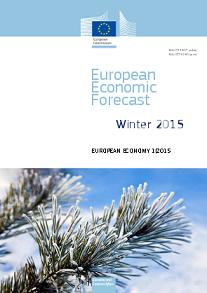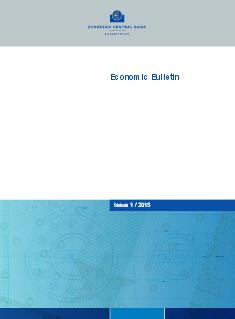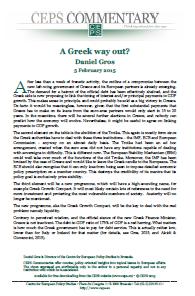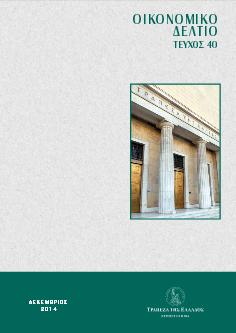Cook, C. (2015) “Greece – a Varoufakis Conversion“, Pieria Online, 06 Φεβρουαρίου. Greece’s new Syriza government has two major economic challenges to address: a Resolution of Greece’s unsustainable debt burden followed by a Transition to a long term sustainable economy. Conventional resolution of sovereign debt is a debt for debt swap: replacing existing debt with new debt which requires a smaller percentage of Greece’s national income and resources to …Read More
European Economic Forecast: Winter 2015
European Commission (2015) European Economic Forecast: Winter 2015, European Economy 1|2015, DG for Economic & Financial Affairs, Φεβρουάριος. GDP growth in the EU remains sluggish. Sputtering investment has so far prevented a broader and more robust acceleration of domestic demand. Amid challenging global conditions, the fall in crude oil prices should provide a welcome boost to growth. Several important shifts are under way in the global economy. Falling oil …Read More
Update on Economic and Monetary Developments, Economic Bulletin Issue 1/2015
ECB (2015) Update on Economic and Monetary Developments, Economic Bulletin Issue 1/2015, European Central Bank, Φεβρουάριος. Summary The recent decline in oil prices is supporting the global economic recovery. Nevertheless, the recovery remains gradual and economic developments vary across regions. Growth in the United States remains robust, momentum is slowing in China, and activity in Japan has not regained traction. Economic conditions in Russia have deteriorated further, but spillovers …Read More
Greece: ECB Kicks Syriza in the Face; Syriza Turns the Other Cheek
Weisbrot, M. (2015) “Greece: ECB Kicks Syriza in the Face; Syriza Turns the Other Cheek“, The Huffington Post, 05 Φεβρουαρίου. On Wednesday the European Central Bank (ECB) announced that it would no longer accept Greek government bonds and government-guaranteed debt as collateral. Although Greece would still be eligible for other, emergency lending from the Central Bank, the immediate effect of the announcement was to raise Greek borrowing costs and …Read More
Je suis Dijsselbloem ou Varoufakis?
Χατζησταύρου, Φ. (2015) “Je suis Dijsselbloem ou Varoufakis?“, Protagon Website, 04 Φεβρουαρίου. Η πρώτη συνάντηση Βαρουφάκη-Ντάισελμπλουμ φέρνει στη δημόσια συζήτηση ένα θέμα που μέχρι τώρα ήταν αντικείμενο ανάλυσης κυρίως των ενασχολούντων με τη θεσμική λειτουργία της ΕΕ στα οικονομικά θέματα. Ευκαιρία, λοιπόν, να δούμε ποιο είναι το πρόβλημα, γιατί υπάρχει πρόβλημα, και ποιες οι συνέπειές του μέχρι σήμερα. Από το 2010 και μετά οι ευρωπαϊκές κυβερνήσεις ομόφωνα προχώρησαν στην …Read More
A Greek Way Out?
Gros, D. (2015) “A Greek Way Out?“, Economic Policy: Commentaries, Centre for European Policy Studies, 05 Φεβρουαρίου. In his analysis of the basic compromise that is emerging between the new left-wing government of Greece and its European partners, Daniel Gros emphasises that the key element will be how the real problem, namely liquidity, is dealt with. Σχετικές αναρτήσεις: Stockman, D. (2015) “History In the Balance: Why Greece Must …Read More
A Greek Morality Tale
Stiglitz, J. (2015) “A Greek Morality Tale“, Social Europe Journal, 04 Φεβρουαρίου. When the euro crisis began a half-decade ago, Keynesian economists predicted that the austerity that was being imposed on Greece and the other crisis countries would fail. It would stifle growth and increase unemployment – and even fail to decrease the debt-to-GDP ratio. Others – in the European Commission, the European Central Bank, and a few universities …Read More
Πιθανά Φορολογικά Οφέλη από την Επιτάχυνση της Οικονομικής Ανάπτυξης
Ταγκαλάκης, Α., “Πιθανά Φορολογικά Οφέλη από την Επιτάχυνση της Οικονομικής Ανάπτυξης“, στο Οικονομικό Δελτίο, Τεύχος 40, Τράπεζα της Ελλάδος: Ευρωσύστημα, Δεκέμβριος 2014. Η Ελλάδα έχει σημειώσει εντυπωσιακή πρόοδο σε δημοσιονομικό επίπεδο τα τελευταία χρόνια. Ειδικότερα το 2013 επιτεύχθηκε πρωτογενές πλεόνασμα (σε όρους του Προγράμματος Οικονομικής Προσαρμογής–ΠΟΠ) ύψους 1,2% του ΑΕΠ (έναντι στόχου στο ΠΟΠ για μηδενικό πρωτογενές αποτέλεσμα) για πρώτη φορά από το 2002. Επιπλέον, το πρωτογενές αποτέλεσμα βελτιώθηκε …Read More
History In the Balance: Why Greece Must Repudiate Its “Banker Bailout” Debts And Exit The Euro
Stockman, D. (2015) “History In the Balance: Why Greece Must Repudiate Its “Banker Bailout” Debts And Exit The Euro“, David Stockman’s Contra Corner Blog, 02 Φεβρουαρίου. Now and again history reaches an inflection point. Statesman and mere politicians, as the case may be, find themselves confronted with fraught circumstances and stark choices. February 2015 is one such moment. For its part, Greece stands at a fork in the road. Syriza can move aggressively to recover Greece’s …Read More
We Need An Industrial And Innovation Policy For Europe
Pini, P. & Antonioli, D. (2015) “We Need An Industrial And Innovation Policy For Europe“, Social Europe Journal, 30 Ιανουαρίου. The prolonged economic crisis since 2008 has drastically reduced incomes and employment levels and the promised recovery will not reabsorb unemployment, particularly in Europe. Nevertheless, economic policy in Europe is sticking to past recipes based on two mainstays: fiscal austerity and labour flexibility. This strategy does increase the short-run …Read More











